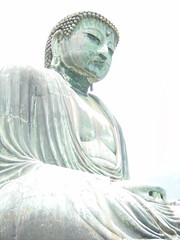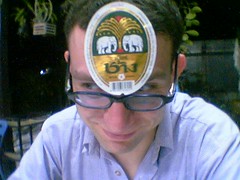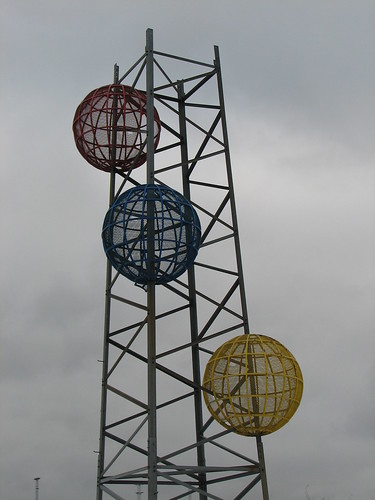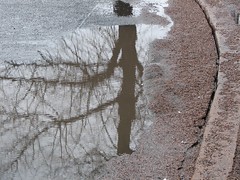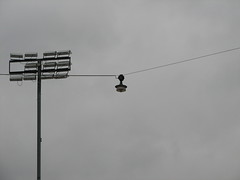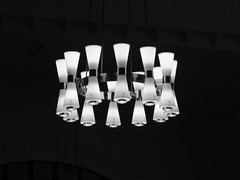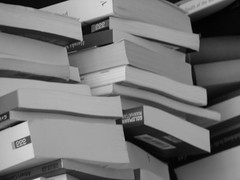 Yesterday I re-arranged the better part of my books. Not all of them, only the novels. Most of the novels. Since months they were trying to conquer my little apartment, piling in every corner, hiding when I was looking for one of them. Books are cruel when you don't find them. Or when they are not strong enough to keep you reading. Then they end up somewhere in the kitchen or fall from the bedside table and wait for further attention. Most of them start closer relationships with dust, which is also very attracted to books.
Yesterday I re-arranged the better part of my books. Not all of them, only the novels. Most of the novels. Since months they were trying to conquer my little apartment, piling in every corner, hiding when I was looking for one of them. Books are cruel when you don't find them. Or when they are not strong enough to keep you reading. Then they end up somewhere in the kitchen or fall from the bedside table and wait for further attention. Most of them start closer relationships with dust, which is also very attracted to books.
I only read novels, nothing else. Since two decades I try to read books about science, biographies, psychological and philosophical literature. It never really works for me. I read the biography of Richard Feynman and "Fermat's Last Theorem" and that should be enough non-fiction for a lifetime. This nevertheless does not stop me from buying more non-fiction books. I look into them every now and then, spend some time inside them, but never really read them from cover-to-cover. One of my latest acquisition is "Die Rückkehr der Geschichte" ("The return of history") by former German foreign minister Joschka Fischer. I started reading it. It was very interesting. In the middle of the second chapter I stopped and now it leans against a half-read Willy Brandt biography and smooches with dust.
There are also many novels that I own but did not read – yet. They just keep coming in and start living with me. They tell me that they are very interesting and worth spending money and time on them. Once they are bought, they are a part of me. It seems impossible to get rid of them. I know I am an addict - but books are not my only addiction and I cannot care for every weakness that I have, so let's don't get into an argument whether it makes sense to buy something that is only used to bind dust.
Believe me, I tried to free myself from the addiction. At least once every week I have this vision of a free life, in which I only own a bed, two chairs, a table and a laptop. Books I would lend from the library, as every sound person does. It is a wonderful thought, I always feel light and happy when I think it.
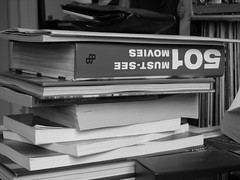 During the last weeks I found out about BookCrossers, a group of people who intentionally lose their books. They register them beforehand in the internet, where they get a registration number that they write into the book together with a note that the person, who finds it, should go to the webpage and type the number in. That way the journey of a book can be followed. This sounded like the end of my addiction: I would lose all my books. I would take the best ones first, register them and share them one by one with the entire world.
During the last weeks I found out about BookCrossers, a group of people who intentionally lose their books. They register them beforehand in the internet, where they get a registration number that they write into the book together with a note that the person, who finds it, should go to the webpage and type the number in. That way the journey of a book can be followed. This sounded like the end of my addiction: I would lose all my books. I would take the best ones first, register them and share them one by one with the entire world.
Of course that dream was over when I stood in front of my shelf. First I took out "Post Office" and even before I had typed it's ISBN into the BookCrossers webpage I felt a scalpel sliding along the inside of my stomach. I was about to cut off an essential part of my body. Maybe I should start with a book which I have read several years ago, not one that I just finished. "Post Office" went on a pile again and I took out "The Music of Chance" – but no, not this one. Maybe a German book? Who wants to find a German book in Finland – it makes no sense to lose it here. Keep it, Georg, keep it! Even those that I had not read, that I never intend to read in the future, I could not decide to lose.
Yesterday I took a long look into the abyss of my character. Afterwards I gave in and decided to keep them all and to re-arranged at least the novels. Most of the novels. They went on several piles on my desk. German literature. Poetry. Crime. English and American writers. French authors. Finish stuff. The piles grew fast. I dragged the victims of my inattention out from every corner of the 42 square meter flat, blew the dust from them and put them on top of their pile. That was the easy part.
My shelf has four boards for fiction books, not counting in the crime and SF-stuff. Four boards of what some people might call "real literature". That is not enough, naturally. Some years ago I started to put there two rows of books on each board. This saves a lot of space and has many disadvantages. The books in the rear row are not visible, which makes it impossible to sort the books alphabetically by author, because either "Auster, Paul" or "Wolf, Christa" will end up in the back row, but to both of them immediate access is needed from time to time.
The moment I started to sort the piles into the shelf, the books began to quarrel. Hesse demanded the front row, as well as Sophocles and Frisch. Brautigan put out his elbows and had a longer fight with Coupland. I threatened them that I will lose them all via BookCrossers, but they did not take me serious anymore. "Put the old farts in the back" Kerouac said, which caused a heavier bi-lingual edition of "the Tempest" to throw itself in a suicidal act of revenge on top of "On the Road". They both survived.
It took me a while to gain back my authority. Putting "Illuminatus" next to "Animal Farm" into the back row was close to losing them. They looked at me with their paperback spines, implying that I would not love them anymore and I apologized woefully until Arthur Miller covered them from the front. It was not easy.
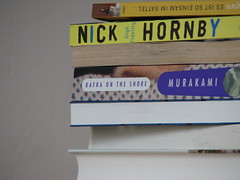 The crime books were not that complicated to handle, as they all fit in the front of the philosophy books, that since long gave up to complain about their back row existance. Dashiell Hammett and Raymond Chandler took their established positions and seem to do well with each other, whilst Sartre and Camus go on discussing existentialism in the background.
The crime books were not that complicated to handle, as they all fit in the front of the philosophy books, that since long gave up to complain about their back row existance. Dashiell Hammett and Raymond Chandler took their established positions and seem to do well with each other, whilst Sartre and Camus go on discussing existentialism in the background.
After that I was exhausted. In an unbelievable effort of strength I switched on the vacuum cleaner, which sucked in all the dust. All the novels are sorted now and have their place. For a while at least. Time to care for the records and CDs next.


